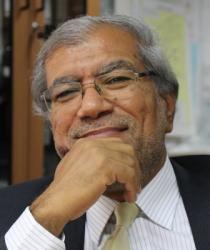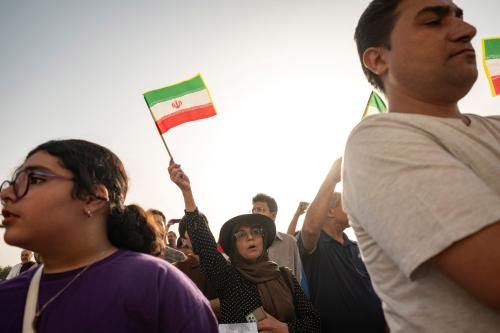

3:00 pm EDT - 4:00 pm EDT
Past Event
3:00 pm - 4:00 pm EDT
1775 Massachusetts Ave., NW
Washington, DC
Watch This Briefing
(Windows Media)
The Saban Center for Middle East Policy held a policy briefing with Amnon Lipkin-Shahak, former Deputy Prime Minister of Israel and former Israel Defense Forces’ Chief of General Staff, and Khalil Shikaki, the Director of the Palestinian Center for Policy and Survey Research in Ramallah. Martin Indyk, Director of the Saban Center, chaired the discussion.
The briefing was held at the conclusion of the seventh Daniel Abraham Israeli-Palestinian Workshop, in which a group of leading Israelis and Palestinians, along with representatives from the international community met for two and a half days of closed-door discussions in the Saban Center at the Brookings Institution. The purpose of this year’s Workshop was to focus on discussing recommendations for U.S. policy in promoting Israeli-Palestinian peace within the context of Hamas’ victory in the January 25, 2006 Palestinian Legislative Council elections and Israel’s proposed unilateral disengagement from the West Bank following its earlier disengagement from the Gaza Strip in August 2005.
Martin Indyk began the briefing by noting that there was urgency in the Workshop discussions because of the likelihood that a humanitarian crisis would emerge within the Palestinian territories within a matter of months.
Khalil Shikaki argued that the Bush Administration needs to define better its objective in the Palestinian territories. Most Palestinians, Shikaki argued, believe the goal of U.S. policy is to force the collapse of the Hamas-led government that assumed power following the January 2006 elections. However, the Bush Administration has not been clear if this is actually its intention, or if it trying to induce Hamas to moderate its policies.
Shikaki said that the United States should demand that Hamas agree to place itself under the umbrella of the Palestine Liberation Organization (PLO). Hamas would be hard-pressed to oppose this proposal because most Palestinians support the idea of having the PLO remain as the representative body of Palestinians in their negotiations with Israel. In explaining the political views of the Palestinian public, Shikaki said that a majority of Palestinians support a two-state solution to the conflict and believe that Hamas should recognize Israel. However, although Palestinians have specific demands of Hamas—to moderate, recognize Israel, and pursue a two-state solution to the conflict—they do not support the international community applying pressure on Hamas.
Amnon Lipkin-Shahak began by giving an overview of the Israeli political landscape. He argued that the results of the March 28, 2006 elections indicated a strong shift to the Left in Israeli politics. Lipkin-Shahak noted that although a majority of Israelis supports a negotiated settlement to the conflict with the Palestinians, if negotiating with the Palestinians proves to be impossible, then Israelis support implementation of unilateral measures.
Lipkin-Shahak argued that part of the reason that Hamas was elected was the inability of Palestinian National Authority President Mahmoud Abbas to gain widespread Palestinian support for his Fatah Party. What is needed, Lipkin-Shahak argued, is an internal movement within the Palestinian territories to rebuild the Fatah Party.
Lipkin-Shahak said that Israel is concerned about the impending humanitarian crisis in the Palestinian territories and argued that Israel should take action to prevent this from materializing. However, Lipkin-Shahak argued that Israel will still put its security as a top priority and will finish construction of the security barrier. In addition, Israel will evacuate settlements in the West Bank.
Indyk presented some of the conclusions he had drawn from the Workshop. He noted that by law the United States cannot engage with Hamas, nor should it attempt to do so. Indyk argued that U.S. policy is achieving the opposite results of what is needed. The United States has held up $450 million in appropriated funding to the Palestinians, but Hamas has used this to gain public support. Indyk suggested that the international community should create a trust fund, within which the United States should deposit the $450 million and Israel should deposit Palestinian tax revenue. Such a trust fund, Indyk argued, could be used to prevent a humanitarian crisis in the West Bank and Gaza Strip.
Indyk suggested that the United States work to strengthen the office of the presidency, which Mahmoud Abbas holds. In particular, the United States should help build Abbas’ security force, the presidential guard. Abbas’ security force has been used effectively in the past to prevent terrorists from crossing into Israel.
Indyk offered his views of what will happen in the upcoming meeting in May between President George W. Bush and Prime Minister Ehud Olmert. Indyk predicted that Olmert will be looking for financial compensation for Israel’s future withdrawal from the West Bank. In addition, Olmert will likely ask President Bush to announce that Israel’s withdrawal complies with the territorial component of U.N Security Council Resolution 242. This will present an opportunity for Bush, Indyk argued, to press Israel to implement land swaps that make up for the settlement areas from which will not withdraw. Doing this, as well as pressing Israel to allow for territorial contiguity between Jerusalem and the West Bank, would set the framework for future negotiations.
Read the full transcript (PDF—68kb)



Pavel K. Baev, Robert Einhorn, Sharan Grewal, Samantha Gross, Ryan Hass, Patricia M. Kim, Elizabeth N. Saunders, Yun Sun, Caitlin Talmadge, Shibley Telhami, Andrew Yeo
July 1, 2025

Suzanne Maloney
June 28, 2025

Suzanne Maloney
June 22, 2025